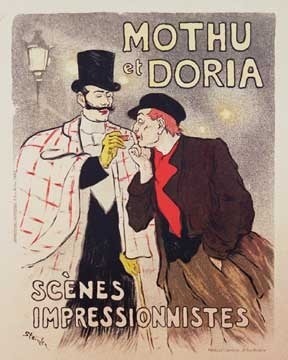The Year of Reading Proust discussion

This topic is about
Time Regained
Time Regained, vol. 7
>
Through Sunday, 8 Dec.: Time Regained
message 1:
by
Jason
(last edited Jan 04, 2013 08:25PM)
(new)
-
added it
Sep 30, 2012 05:13PM
 This thread is for the discussion that will take place through Sunday, 8 Dec. of Time Regained, to page 265 (to the paragraph beginning: “But this species of optical illusion...”)
This thread is for the discussion that will take place through Sunday, 8 Dec. of Time Regained, to page 265 (to the paragraph beginning: “But this species of optical illusion...”)
reply
|
flag
 Another wonderful letter in the recently discovered collection that Proust sent to his neighbor Mme Williams in Bvd Haussmann is number #14 probably written in the Fall of 1914.
Another wonderful letter in the recently discovered collection that Proust sent to his neighbor Mme Williams in Bvd Haussmann is number #14 probably written in the Fall of 1914.Proust complains that his work is to have three volumes but that editors do not want to publish three volumes at the same time, and that now that the war has begun, although publishing continues (for some books by friends of his are coming out), his editor has been called to the front. So, he has to accept that only sections of his second book should have appeared in the NRF. He then says to Mme Williams that not only would those published fragments not give her an idea of his work, because they are not complete, but also he thinks this second volume is not that important.
The key volume is the third one.. for C'est le 3ème qui projette la lumière et éclaire les plans du reste. Seulement quand on fait des ouvrages en trois volumes à une époque où les éditeurs ne veulent en publier qu'un à la fois, il faut se résigner à ne pas être compris, puisque le trousseau de clefs n'est pas dans le même corps du bâtiment que les portes closes..
We will be soon holding the set of keys.

 And the third volume is Le Temps Retrouvé with the last section of Albertine Disparue?
And the third volume is Le Temps Retrouvé with the last section of Albertine Disparue?The first must comprise more than our present first volume but also all of A l'Ombre. That makes the second, the less important one, composed of Le Côté de Guermantes and Sodome et Gomorrhe along with perhaps some sections from La prisonnière? That composition would make sense to me - I see most of the fifth and sixth volumes being a diversion from the original plan.
 Fionnuala wrote: ", ..."
Fionnuala wrote: ", ..."Yes, more or less, I guess... I plan to work on this when we are finished. The Intros to last volume and this one (not read yet) list the Cahiers with what they contain. The current Temps Retrouvé also contains things (so far the war) that were not originally planned.
I also think Albertine Disparue would have had another volume. A great deal of the plot when he comes back from Venice has been zoomed into a fast track.
 FioFio posted the plan to Proust's apartment in Bvd Haussmann in which there was an "oeil-de-boeuf"... It is through one of these that the Narrator looks into the room where Charlus is being serviced by Maurice...
FioFio posted the plan to Proust's apartment in Bvd Haussmann in which there was an "oeil-de-boeuf"... It is through one of these that the Narrator looks into the room where Charlus is being serviced by Maurice...This scene could seem very tragic, but the way it is written made me laugh... It is a farce... it is ridiculous...
The dialogue.., the language, the mockery..
Non, crapule répondit une autre voix et puisque tu gueules et que tu te traînes à genoux on va t'attacher sur le lit, pas de pitié. pp. 203-204.
which is followed a couple of pages later by this... !!!!
Charlus, who was being humiliated and abused in the scene above now says...
Je ne voulais pas parler devant ce petit qui est très gentil et fait de son mieux. Mais je ne le trouve pas assez brutal. Sa figure me plaît, mais il m'appelle crapule comme si c'était une leçon apprise. p. 206.
 It made me think more of this:
It made me think more of this: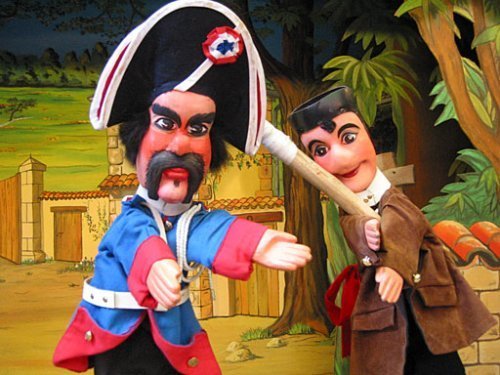
than of this

Prometheus Bound by Jordaens..., 1640.
In the latter please note Hermes, as a smiling voyeur... ready to save him.
 Both images are genius, Kall. I love the Jordaens voyeur with his little chapeau-claque..
Both images are genius, Kall. I love the Jordaens voyeur with his little chapeau-claque..And the quotes you've juxtaposed do underline the humour. I've just begun this section and I'm curious about the parallels that Proust is making between all the couples, Swann and Odette, Saint-Loup and Rachel, and now Charlus and Jupien.
 Fionnuala wrote: "..."
Fionnuala wrote: "..."Imagine Guignol at each coup de bâton shouting "Crapule!, Crapule!..." It is a shame Hermes is not looking through and oeil-de-boeuf...
Yes, the parallelisms with couples are interesting.... and the Charlus and Jupien is another version from the beginnign of Sodome...
 Oh yes, a clear 'rappel' of that scene in the courtyard shop except this time our voyeur sees as well as hears. He did mention looking at the scene in the courtyard but what he described were the sounds he heard rather than what he saw.
Oh yes, a clear 'rappel' of that scene in the courtyard shop except this time our voyeur sees as well as hears. He did mention looking at the scene in the courtyard but what he described were the sounds he heard rather than what he saw. Charlus plays such a major role in the Recherche...
 This scene in a Flemish tavern, by David Teniers II, from 1637.. Smokers in an interior.... comes to my mind reading the Narrator's visit to the hotel.
This scene in a Flemish tavern, by David Teniers II, from 1637.. Smokers in an interior.... comes to my mind reading the Narrator's visit to the hotel.Look at the man peeking through the square oeil-de-boeuf...

"Si on ouvrait la fenêtre, il y a une fumée ici!"; et en effet chacun avait sa pipe ou sa cigarette".p. 201.
 The GF notes draw attention to what they call "Proust's theory of emotions" - when speech is disassociated from one's feelings and in a way from one's mind.
The GF notes draw attention to what they call "Proust's theory of emotions" - when speech is disassociated from one's feelings and in a way from one's mind....ce magnifique langage, si différent de celui que nous parlons d'habitude, et où l'émotion fait dévier ce que nous voulions dire et épanouir à la place une phrase tout autre émergée d'un lac inconnu où vivent ces expressions sans rapport avec la pensée et qui par cela même révèlent.p. 212.
I found this concept fascinating and an excellent conclusion from someone as observant as the Narrator.
 More on the theatrical set up of the whole episode at the hotel.
More on the theatrical set up of the whole episode at the hotel.Now we have the "vasistas" (like in the painting by Teniers above and similar to the oeil de boeuf in Proust's home)...
..il allait ouvrir le vasistas, truc qu'il avait inventé pour que le Baron pût voir et entendre sans être vu, et qu'il allait, me disait-il, retourner en ma faveur contre lui.p.213
 Samples of Boissier and Gouache... the sweets that the Narrator liked when he was a child
Samples of Boissier and Gouache... the sweets that the Narrator liked when he was a child...comme quand j'étais petit et que ma mère venait de faire une commande chez Boissier et chez Gouache, je prenais, sur l'offre d'une des dames du comptoir un bonbon extrait d'un des vases de verre entre lesquels elles trônaient..p. 216.
Violettes...

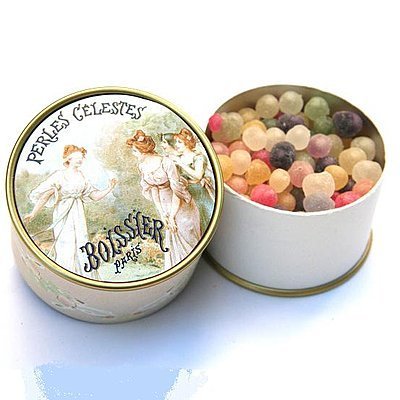
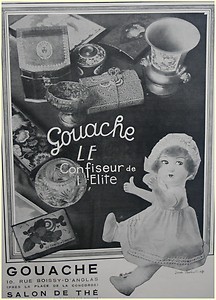
 On the knowledge of the Narrator. If we have him walking in and spying within the hotel, the reader does not know how come the Narrator can tell us that the Deputy of the "Action Libérale" would come to the hotel every day and that on that day his daughter had married at lunch time at Saint-Pierre de Chailllot. He also tells us (from his voyeur position) that the wife of the Deputy was concerned whenever he was late coming home, due to the bombings.
On the knowledge of the Narrator. If we have him walking in and spying within the hotel, the reader does not know how come the Narrator can tell us that the Deputy of the "Action Libérale" would come to the hotel every day and that on that day his daughter had married at lunch time at Saint-Pierre de Chailllot. He also tells us (from his voyeur position) that the wife of the Deputy was concerned whenever he was late coming home, due to the bombings.A most curious digression.
Anyway, this is the Church were the daughter married...
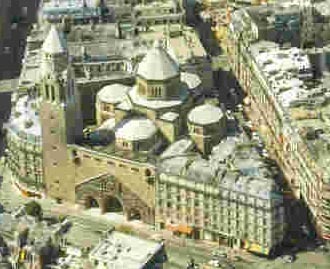
And I found this interesting link on a wedding that took place in 1903, between Georges Menier (an industrialist - chocolatier) and Mlle Simonne. There were 2500 guests.
http://pone.lateb.pagesperso-orange.f...
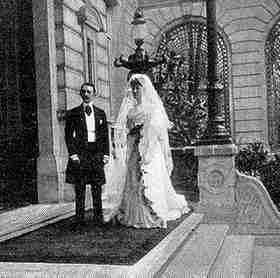
Note a drawing by Helleu of the Simonne, from 1913.
There is a "souvenir" of the wedding at the Musée d'Orsay.
Better to look it up in the link than paste it here.
http://www.musee-orsay.fr/fr/collecti...
 I have to remember on the last week something I learnt from the Letters to the Neighbour, and is in relation to Proust's plan for the character of Charlus and Sarah Bernhardt, who is quoted in this section as an expert on Internal and Foreign affairs.
I have to remember on the last week something I learnt from the Letters to the Neighbour, and is in relation to Proust's plan for the character of Charlus and Sarah Bernhardt, who is quoted in this section as an expert on Internal and Foreign affairs.
 Kalliope wrote: "
Kalliope wrote: "Now we have the "vasistas" (like in the painting by Teniers above and similar to the oeil de boeuf in Proust's home)...
..il allai..."
The theatrical nature, with a mixture of comedy with a moral tint, as well as the tricks of the narrator, makes me think of the plays of Marivaux. This playwright was mentioned in a previous volume. Less prominent than Molière but he also inhabits Proust's world.
 The comparison of the war with Pompei that we saw last week, is now picked up again and elaborated further and associated with Jupien's hotel... and it recalls the biblical Sodoma..
The comparison of the war with Pompei that we saw last week, is now picked up again and elaborated further and associated with Jupien's hotel... and it recalls the biblical Sodoma..The narrator has left the hotel when a German plane arrives flying very low....and one bomb has fallen..
Je pensais à la maison de Jupien, peut-être réduite en cendres maintenant, car une bombe était tombée tout près de moi, comme je venais seulement de sortir, cette maison sur laquelle M. de Charlus eût pu prophétiquement écrire "Sodoma" comme avait fait, ave non minis de prescience ou peut-être au début de l'éruption volcanique et de la catastrophe déjà commencée, l'habitant inconnu de Pompei. p. 225.
 Agostinelli died in a plane accident. Albertine died when she fell off a horse.
Agostinelli died in a plane accident. Albertine died when she fell off a horse.Now we find the link in Proust's mind.
When the Narrator leaves the Jupien hotel, a German plane arrives and he remembers when he was in La Raspelière and went for a horse ride ..
Je pensais à ce jour en allant à la Raspelière où j'avais rencontré comme un dieu qui avait fait se cabrer mon cheval un avion. Je pensais que maintenant la rencontre serait différente et que le dieu du mal me tuerait.. p. 224.
 Startling indirect reference to Proust's work..
Startling indirect reference to Proust's work.. Jupien, in relation to the Arabian Nights, mentions another tale found in a collection called "Sésame et les Lys" - the Narrator supposedly sent to Charlus a translation of Ruskin's work... These Victorian works had been translated by Marcel Proust.
The key is the title of Sésame.. and Jupien's lit window...
 Kalliope wrote: "Now we have the "vasistas" (like in the painting by Teniers above and similar to the oeil de boeuf in Proust's home)...."
Kalliope wrote: "Now we have the "vasistas" (like in the painting by Teniers above and similar to the oeil de boeuf in Proust's home)...."Another great find - that window detail - perfect.
I'm not as far on as you, Kall, but I can see that there is a lot of theatrics in these pages - and our narrator turns omniscient while at the same time seeming a little slow on the uptake about the nature of this 'house'.
As to that interesting phrase you posted:...ce magnifique langage, si différent de celui que nous parlons d'habitude, et où l'émotion fait dévier ce que nous voulions dire et épanouir à la place une phrase tout autre émergée d'un lac inconnu où vivent ces expressions sans rapport avec la pensée et qui par cela même révèlent, I had also underlined it, noting in the margin how often Proust and the Narrator merge into one - this is my personal reaction, I accept that.
I'm very impressed with the way all the threads of the Recherche are drawn together little by little.
From discussions of war and its strategies, we are taken to a discussion of love and the war like strategies that lovers put in place, the parrying and feinting, withdrawing and granting of concessions. So well observed.
 Fionnuala wrote: "
Fionnuala wrote: "Another great find - that window detail - perfect.
I'm n..."
Very true on that passage as a sample of the Narrator and Proust merging into one... I think we will see more of these.
And I am so happy that we this careful and close to the text read, we have paid attention to many references. Because they do matter and crop up again and thus serve to unify the work... A fast read would not bring this characteristic out.
 More farce: Jupien parfois les prévenait qu'il fallait être plus perverse
More farce: Jupien parfois les prévenait qu'il fallait être plus perverseMore irony: Rien n'est plus limité que le plaisir et le vice. On peut vraiment, dans ce sens là, en changeant le sens de l'expression, dire qu'on tourne toujours dans le même cercle vicieux. page 217
And therefore more circling around the same theme: love and the withdrawal of love.
 Further farce : Jupien que son esprit n'abandonnait jamais agita le tronc dans lequel il mettait la contribution de chaque client, et fit sonner en disant: "Pour les frais du culte, Monsieur l'abbé!" p 219
Further farce : Jupien que son esprit n'abandonnait jamais agita le tronc dans lequel il mettait la contribution de chaque client, et fit sonner en disant: "Pour les frais du culte, Monsieur l'abbé!" p 219And further irony - it's non stop: Ici c'est le contraire des Carmels, c'est grâce au vice que vit le vertu. p 220
And on the next page, Charlus mentions the word 'farce' - his preferred kind of theatre after classical.
 Fionnuala wrote: "Further farce : Jupien que son esprit n'abandonnait jamais agita le tronc dans lequel il mettait la contribution de chaque client, et fit sonner en disant: "Pour les frais de la culte, Monsieur l'a..."
Fionnuala wrote: "Further farce : Jupien que son esprit n'abandonnait jamais agita le tronc dans lequel il mettait la contribution de chaque client, et fit sonner en disant: "Pour les frais de la culte, Monsieur l'a..."The audio version of the sentence "Pour les frais du culte.." made me laugh because the reader put on a sort of nasal voice an read it with a very flat tone... pure mockery.
 More on the bad priest (mauvais prêtre) and irony... when he excuses himself, and..
More on the bad priest (mauvais prêtre) and irony... when he excuses himself, and.... d'un air grave, et levant vers son visage hideux un doigt de docteur en théologie, dit sentencieusement: "Que voulez vous, je ne suis pas (j'attendais "un saint") une ange." p. 219
This priest is elevating himself higher than a saint...
Many angels lately.. The Reims smiling angel, the Bellini, Giotto's and also Charlus conviction that he is protected by the Archangel Raphaël.. while the German planes are like evil deities....
 Haha.. in the painting by Jordaens above we see Hermes wanting to save Prometheus... but the Narrator wishes himself to be like the Calife in the Arabian Nights who will save the man who is being hit..
Haha.. in the painting by Jordaens above we see Hermes wanting to save Prometheus... but the Narrator wishes himself to be like the Calife in the Arabian Nights who will save the man who is being hit..Similar compassion to Hermes'.
J'avais cru comme le calife des Mille et Une Nuits arriver à point au secours d'un homme qu'on frappait... p. 223.
 The Narrator peeping at Charlus willingly being whipped, his being secreted away in the darkness by Jupien to view the Baron exit the hôtel, his coming on the love letters from Morel to Bobette (Saint Loup), his discovering at L'hôtel Guermantes the carnal relations of Jupien and Charlus, his seeing Mlle Vinteuil and her friend make love at Montjouvan; yes, the Narrator is a voyeur but so are you reader. Reading is a voyeuristic activity and that was mentioned earlier, particulary reading about the experiences of a first person narrator. You see what he sees, Françoise, Albertine, the Duchess, grandmother, etc. in your oeil-de-beouf book, reader. Nobody knows what others know, even the voyeurs.
The Narrator peeping at Charlus willingly being whipped, his being secreted away in the darkness by Jupien to view the Baron exit the hôtel, his coming on the love letters from Morel to Bobette (Saint Loup), his discovering at L'hôtel Guermantes the carnal relations of Jupien and Charlus, his seeing Mlle Vinteuil and her friend make love at Montjouvan; yes, the Narrator is a voyeur but so are you reader. Reading is a voyeuristic activity and that was mentioned earlier, particulary reading about the experiences of a first person narrator. You see what he sees, Françoise, Albertine, the Duchess, grandmother, etc. in your oeil-de-beouf book, reader. Nobody knows what others know, even the voyeurs.But so what? So let there be music, better a polyphony, of knowing and unknowing. What do you know, reader; what does the Narrator know, what do the characters he describes know. You see, nobody knows everything, not even the author as this novel, as all art is, is a hand-made item and his hands died, they couldn't finish their task. I suspect had Proust not died for another 10 years, ISOLT would be just as unfinished as it now is, but longer. Dear, dear Marcel...he did like to write.
Now I referred you to unreliable first person narrators before (all first person narrators are unreliable because they don't know the future) and we have a new thing in this volume. Before we had a younger present-tense Narrator and a reflection on his actions by another first person Narrator, his older self. Now we come to the close of the novel and we have only one first person Narrator, the present-tense Narrator has become the reflective Narrator. There are no longer two voices of narration as in previous volumes. So the question becomes what doesn't this current Narrator know as he is unreliable too, even beyond how he might write.
As I made my way home, I reflected upon the speed with which conscience ceases to be a partner in our habits, which she allows to develop freely without bothering herself about them, and upon the astonishing picture which may consequently present itself to us if we observe simply from without, and in the belief that they engage the whole of the individual, the actions of men whose moral or intellectual virtues may at the same time be developing independently in an entirely different direction. ML p. 213
This is not the thought of the child 'in love' with Albertine.
 Eugene wrote: "There are no longer two voices of narration as in previous volumes. So the question becomes what doesn't this current Narrator know as he is unreliable too, even beyond how he might write."
Eugene wrote: "There are no longer two voices of narration as in previous volumes. So the question becomes what doesn't this current Narrator know as he is unreliable too, even beyond how he might write."Excellent post, Eugene. Are we perhaps slowly approaching the beginning of the book...? Time (rather, the attempt at its recapture) is now curving back around to the "start," if there is one?
 Kate wrote: "Charlus was convinced he was protected by the Archangel Michael !"
Kate wrote: "Charlus was convinced he was protected by the Archangel Michael !"Actually, both Michael and Raphaël are important for Charlus... He spoke of Raphaël et Tobie in Sodome et Gomorrhe.
 Kalliope wrote: "
Kalliope wrote: "Now we find the link in Proust's mind.
When the Narrator leaves the Jupien hotel, a German plane arrives and he re..."
If Proust had been indirectly alluded to (when his translations of Ruskin are mentioned by Jupien), now he talks to us directly. And he does so by claiming to be the creator of this work and that only Françoise's wealthy relatives are real.
Dans ce livre où il n'y a pas un seul fait qui ne soit fictif, où il n'y a pas u seul personnage "à clefs", où tout a été inventé par moi selon les bessons de man démonstration, je dois dire à la louange de mon pays que seuls les parents millionaires de Françoise ayant quitté leur retraite pour aider leur nièce sans appui, que sels ceux-là sont des gens réels, qui existent. p. 239.
The question is then, who is Françoise'
 Martin wrote: Are we perhaps slowly approaching the beginning of the book...?
Martin wrote: Are we perhaps slowly approaching the beginning of the book...?Of course all authors would like their books to be read again but but with the readers of Proust it seems to be de rigueur, at least here.
I wonder if Proust entertained the thought of people reading ISOLT multiple times? What would he have thought of Proustians, whatever they are? Often he seems to place the effects before their explicated causes and that discovery will yield a very smacking 2nd reading, if you have poor memory ;-)
 Notice the different wants of the Narrator and Charlus at the hotel. The former didn't want to be lied to by Albertine in order that he could pursue his pleasure; while the latter wants to be lied to convincingly to pursue his.
Notice the different wants of the Narrator and Charlus at the hotel. The former didn't want to be lied to by Albertine in order that he could pursue his pleasure; while the latter wants to be lied to convincingly to pursue his.
 The Baron's grand scene:
The Baron's grand scene:"...in a monotonous tone, stammering slightly and with a dull sepulchral resonance: 'Hannibal de Bréauté, dead! Antoine de Mouchy, dead! Charles Swann, dead! Adalbert de Montmorency, dead! Boson de Talleyrand, dead! Sosthene de Doudeauville, dead!'" MP
http://www.pinterest.com/pin/26099774...
Raoul Ruiz' film clip above, with John Malkovich as the Baron de Charlus.
http://www.imdb.com/title/tt0189142/?...
Advertised in the Balbec poster

 Martin wrote: "Eugene wrote: "There are no longer two voices of narration as in previous volumes. So the question becomes what doesn't this current Narrator know as he is...
Martin wrote: "Eugene wrote: "There are no longer two voices of narration as in previous volumes. So the question becomes what doesn't this current Narrator know as he is..."...curving back around to the "start," if there is one?"
In last week's reading...with the narrator in bed, reading before he put out his candle...before "fatigue closed" his eyes...reminded me of the beginning of the book.
"It was a newly published volume of the Journal of the Goncourts. And when, before putting out my candle, I read the passage which I am about to transcribe...."
[...]
"Here are the pages that I read before fatigue closed my eyes …" MP (TR)
Now..."curving back around to the 'start'..."
For a long time I used to go to bed early. Sometimes, when I had put out my candle, my eyes would close so quickly that I had not even time to say “I’m going to sleep.” And half an hour later the thought that it was time to go to sleep would awaken me; I would try to put away the book which, I imagined, was still in my hands, and to blow out the light; I had been thinking all the time, while I was asleep, of what I had just been reading, but my thoughts had run into a channel of their own, until I myself seemed actually to have become the subject of my book: a church, a quartet, the rivalry between François I and Charles V. This impression would persist for some moments after I was awake; it did not disturb my mind, but it lay like scales upon my eyes and prevented them from registering the fact that the candle was no longer burning. Then it would begin to seem unintelligible, as the thoughts of a former existence must be to a reincarnate spirit...."
[...]
"It is a very different kind of existence at Tansonville now with Mme. de Saint-Loup, and a different kind of pleasure that I now derive from taking walks only in the evenings, from visiting by moonlight the roads on which I used to play, as a child, in the sunshine; while the bedroom, in which I shall presently fall asleep instead of dressing for dinner, from afar off I can see it, as we return from our walk, with its lamp shining through the window, a solitary beacon in the night." MP (Swann's Way)
("...beacon in the night" reminds me of Bergotte's books in the windows.)
I was always curious...where was the narrator in the opening pages?
He could have been in Transonville, reading by candle light about the people he knew...his past...in the pages of the Goncourt Journal, before he drifted off...
 Kalliope wrote: "Kalliope wrote: "
Kalliope wrote: "Kalliope wrote: "Proust had been indirectly alluded to (when his translations of Ruskin are mentioned by Jupien), now he talks to us directly. And he does so by claiming to be the creator of this work and that only Françoise's wealthy relatives are real..
The question is then, who is Françoise'"
Françoise is a composite of Céleste, and two other cooks.
Ernestine Gallou, who "ruled over"* the Aimot's household for 30 years, and Céline Cottin, who was his cook before Céleste arrived, Céleste herself...and his thoughts on Old France, the war, cruelty, the servant class, the value of money, etc., Proust was able to create our Françoise. (Carter's biography, p. 26)
The two messenger girls in Balbec, are based on Céleste Albaret and her sister, Marie Gineste.
The Larivières, were Céleste Albaret's cousins.
According to Carter, on Proust-Ink.com, "He (Proust) consulted Céleste's niece Marcelle Larivière, about two high school French compositions he intended to assign to Gisèle."
Scroll down: http://www.proust-ink.com/proustaz-l/
Obviously, there are many "real persons" named in the novel.
Here is an interesting article...(spoilers)...about the name "Larivière."
"Larivière is not only very ‘French’, it is also literary, the name of one of the most decent characters in the history of the French novel, Dr Larivière of Madame Bovary)."
http://www.lrb.co.uk/v15/n13/christop...
 Marcelita wrote: "The Baron's grand scene:
Marcelita wrote: "The Baron's grand scene:Marcelita wrote: "The Baron's grand scene:
"...in a monotonous tone, stammering slightly and with a dull sepulchral resonance: 'Hannibal de Bréauté, dead! Antoine de Mouchy, dead! Charles Swann, dead! Adalbert de M..."
I would love to see Malkovich as Charlus.., although I imagine Charlus more benevolent than Malkovich in spite of everything.
 Marcelita wrote: "Kalliope wrote: "Kalliope wrote: "
Marcelita wrote: "Kalliope wrote: "Kalliope wrote: "Proust had been indirectly alluded to (when his translations of Ruskin are mentioned by Jupien), now he talks to us directly. And he does so by claiming to be the..."
Thank you, Marcelita. But my question was more rethorical than factual. To me it was interesting that the author steps in to say that some characters who are family of a supposedly fictional person, are real. So, part of their reality is fictional as well. Or part of the fiction is real.
 Marcelita wrote: "Relationships
Marcelita wrote: "RelationshipsTheophile Alexandre Steinlen's "Mothu et Doria" 1896"
Vey apt, Marcelita - That affectionate intimacy in the lighting of the cigarette is exactly how I imagine the relationship between Charlus and Jupien.
And the Narrator in the opening passages of the Recherche could have been lying in bed in Tansonville and, yes, I like your idea that dreaming of the social whirl described in the Goncourt Journals, might have inspired the entire Recherche...
 Kalliope wrote: "Proust had been indirectly alluded to (when his translations of Ruskin are mentioned by Jupien)."
Kalliope wrote: "Proust had been indirectly alluded to (when his translations of Ruskin are mentioned by Jupien)."And Jupien goes on to mention the forty thieves, or ten, that might be found any mille et une nuits at his house and his own personal Sesame which he gives the Narrator - the lighted window - but not if he's looking for 'Lys'..
Jupien as Ali Baba!
The references to the destruction by the bombing and Pompeii are like a refrain in this long night of wandering Paris - it's clear that the Narrator imagines Charlus, like the inhabitants of Herculaneum, taking his treasures/ pleasures with him as he seeks safety in the underground. Such interesting parallels.
This weeks reading is so rich - I underlined many passages, too many to post here - but I want to post this one about the irrationality of fear:
On peut avoir peur de ne pas dormir et nullement d'un duel sérieux, d'un rat et pas d'un lion
I remember dreams about rats which the Narrator described in the early pages of Le Côté de Guermantes. I think the rats in question were his parents..
 Fionnuala wrote: "Kalliope wrote: "Proust had been indirectly alluded to (when his translations of Ruskin are mentioned by Jupien)."
Fionnuala wrote: "Kalliope wrote: "Proust had been indirectly alluded to (when his translations of Ruskin are mentioned by Jupien)."And Jupien goes on to mention the forty thieves, or ten, that might be found any ..."
Yes, and Pompeii also becomes the real Sodome... And also brings up the issues of punishment and morality.
I had forgotten about the dream of the rats...
 Kalliope wrote: "FAnd also brings up the issues of punishment and morality."
Kalliope wrote: "FAnd also brings up the issues of punishment and morality."Yes, and I finally understand your earlier posting of that image of Prometheus. But as I read about Charlus clouer par la Force au rocher de la pure Matière, I was already questioning that and as often happens, the next paragraph contradicts that image - the Narrator accepts that Charlus might have some nobler motivations.
 Yes, (and I will put the quote later on.. it is also later in the text).. there is an explanation to the bizarre behaviour of Charlues in Jupien's hotel (bizarre in both its extremes).. all goes back also to the concept of "virility" and where it resides...
Yes, (and I will put the quote later on.. it is also later in the text).. there is an explanation to the bizarre behaviour of Charlues in Jupien's hotel (bizarre in both its extremes).. all goes back also to the concept of "virility" and where it resides...
 Et voilà la valeur des témoignages et des souvenirs. P233
Et voilà la valeur des témoignages et des souvenirs. P233So the eye witness account is valued above the recalled memory - interesting remark to find in this Recherche du Temps Perdu
 Fionnuala wrote: "Kalliope wrote: "FAnd also brings up the issues of punishment and morality."
Fionnuala wrote: "Kalliope wrote: "FAnd also brings up the issues of punishment and morality."Yes, and I finally understand your earlier posting of that image of Prometheus. But as I read about Charlus clouer par ..."
Upcoming exhibition at the Prado...
Rubens' version of Prometheus (no Hermes there) is coming from Philadelphia to Madrid.
http://www.museodelprado.es/en/exhibi...

 Fionnuala wrote: "Kalliope wrote: "FAnd also brings up the issues of punishment and morality."
Fionnuala wrote: "Kalliope wrote: "FAnd also brings up the issues of punishment and morality."Yes, and I finally understand your earlier posting of that image of Prometheus. But as I read about Charlus clouer par ..."
Yes, the Prometheus image is brought up twice... once (p. 204) as the Narrator is looking through the oeil-de-boeuf (I love that image - and this is the part that I found funny, more like a guignol than an episode of the gods) and again, and is elaborated further, in page 230, where le rocher de pure Matière takes on a stronger meaning (allowing un peu d'Esprit to play a part as well).
 Kalliope wrote: "Yes, (and I will put the quote later on.. it is also later in the text).. there is an explanation to the bizarre behaviour of Charlues in Jupien's hotel (bizarre in both its extremes).. all goes ba..."
Kalliope wrote: "Yes, (and I will put the quote later on.. it is also later in the text).. there is an explanation to the bizarre behaviour of Charlues in Jupien's hotel (bizarre in both its extremes).. all goes ba..."Now I can quote from the passage on the virility...
... Au fond de tout cela il y avait chez M. de Charlus tout son rêve de virilité, attesté au besoin par des actes brutaux, et toute l'enluminure intérieure, invisible pour nous, mais dont il projetait ainsi quelques reflets, de croix de justice, de tortures féodales, que décorait son imagination moyenâgeuse.. p. 232.
I think FioFio this is the part you were referring to when you wrote that the Narrator accepts nobler motivations in Charlus. I believe also JoJo quoted part of this.
It is a wonderful quote. It picks up on the virility theme that had been brought up before and also ties in with what is really the Narrator's interest in the Middle Ages...
 Venice comes back and it signals resurrection.... and Proust himself can be guessed in the text...
Venice comes back and it signals resurrection.... and Proust himself can be guessed in the text...Ce désir que réveille chaque fois la vue d'une écuyère, qui dira jamais à quel rêve conscient et durable il est lié, inconscient et aussi mystérieux que l'est par example pour quelqu'un qui avait souffert toute sa vie de crises d'asthme, l'influence d'une certaine ville, en apparence pareille aux autres, et où pour la première fois il respire librement.p. 232.



